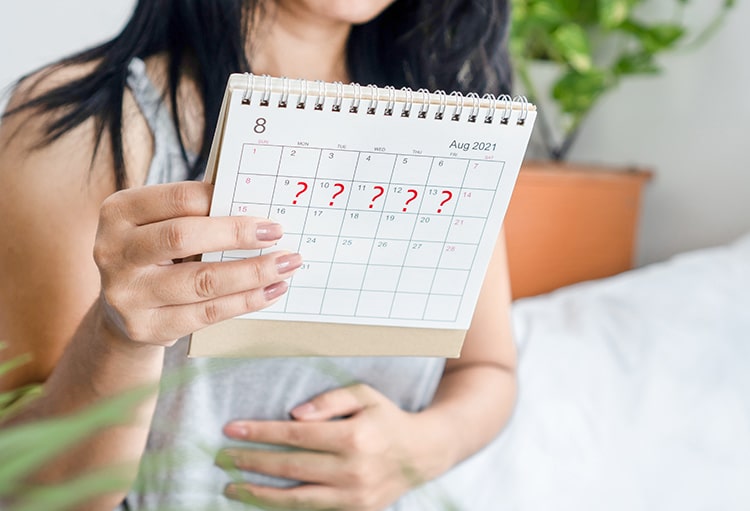

Verified by Dr. Sandip Sonara
Advanced gynec Laparoscopic & Gynec Onco Surgeon
Periods that arrive later than expected can cause anxiety and concern for many women. A late period is defined as a menstrual cycle that is longer than your normal cycle length. There are many potential reasons why periods may be late, most are harmless but some require medical attention. This article explores the common causes of late periods, symptoms to look out for, and online ayurvedic consultation for late periods.
What is Considered a Late Period?
Menstrual cycles can vary from around 21 to 35 days. If your cycle is generally regular and predictable, a late period is classed as being more than 7 days late. For example, if you have a 28-day cycle, a period that arrives on day 36 or later would be considered late. If your cycles are irregular, a period is typically only considered late if it’s been 60 days or longer since your last period.
Common Reasons for Late Periods:
- Pregnancy: The most obvious cause of a missed period is pregnancy. If you’ve had unprotected sex, take a pregnancy test to confirm.
- Stress: High stress levels can disrupt hormone production leading to delayed ovulation and late periods. Major life events, work stress, and anxiety are common culprits.
- Weight loss or gain: Dramatic changes in body weight impact hormone levels. Losing or gaining a lot of weight quickly can cause cycles to lengthen or become irregular.
- Birth control: Starting, stopping, or changing birth control methods like the pill can temporarily alter your cycle. It can take 3-6 months for it to regulate.
- Perimenopause: As women approach menopause in their 40s, cycles naturally become less predictable with skipped or delayed periods.
- Medical conditions: Health issues like polycystic ovary syndrome (PCOS), pelvic inflammatory disease, endometriosis, thyroid disorders and more may lead to late/missed periods.
- Medications: Some common medications like antidepressants, blood pressure meds, and antihistamines can impact menstrual cycles as a side effect.
When to See a Doctor:
See your doctor if:
- You’ve missed 3 periods or more in a row
- Your period is more than 10 days late and you have a negative pregnancy test
- You have significant pain, fever, bleeding, or other concerning symptoms along with lateness
- You have a known medical condition like PCOS that requires monitoring
- You’re over 45 and notice a change in your normal cycle
- You recently started or changed birth control methods
- You feel lightheaded, extremely fatigued, or are showing possible signs of anemia
Kapeefit online ayurvedic consultation can run tests to identify any underlying medical causes and provide the appropriate treatment. Sometimes no specific cause is found, but your doctor can put your mind at ease. Keep track of your cycles and report any abnormal patterns.
When Late Periods Aren’t a Concern:
- If you have an intrauterine device (IUD) – irregular bleeding is common.
- Breastfeeding – periods usually stop during this time due to hormonal changes.
- If you’re on the birth control pill take it as directed.
- Recent changes like travel, significant illness, or major stress can temporarily impact the menstrual cycle.
Key Takeaways:
- Periods over 7 days late are considered abnormal if you normally have regular cycles.
- Common reasons include pregnancy, stress, weight changes, birth control changes, perimenopause, medications, and some medical disorders.
- See your doctor if you’ve missed 3+ cycles, your period is over 10 days late, you have concerning symptoms, or an existing condition requires monitoring.
- Not all late periods require medical care. Discuss your situation with your doctor.
- Track your cycles and report any unusual changes or patterns to your physician. This can help identify potential problems early.